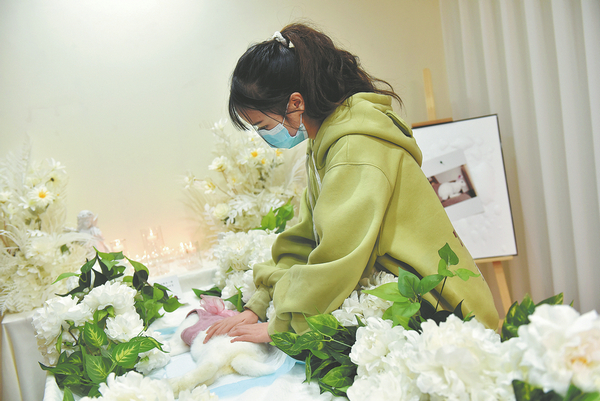Providing a dignified send-off for pets
Morticians providing personalized care for deceased animals bring comfort to families grieving the loss of their beloved ones


Pet morticians, as the ultimate service providers in the pet industry, perform personalized end-of-life care for deceased animals as their owners are willing to pay more for their beloved companions. This involves embalming, grooming, cremation, ceremonies and costumed memorials.
He, 32, who now owns five stores in Wuhan, Guangdong's Guangzhou, Sichuan's Chengdu and Hunan's Changsha, first considered stepping into the pet industry five years ago, and made up his mind after his own dog passed away from canine parvovirus.
"We went to a pet funeral home in a rural area in Wuhan at the recommendation of our veterinarian," he said.
He described it as "an unpleasant experience", not just because of the rough environment — a partially open shed constructed with steel and tarpaulin and several plastic stools — but also because of the "commercialized" atmosphere, with the pet mortician focusing solely on him, the one who paid, and neglecting his weeping wife.
Because they had already cleaned up the carcass at home in advance, the process only involved cremation, costing more than 3,000 yuan ($415).
To engage in the industry, He conducted market research in different cities in China and learned related techniques and regulations.
He attributed the growing popularity of pet funeral services to a rise in people's well-being and a shift in their recognition.
In China, the first pet funeral services emerged in Beijing and some coastal cities in Southeast China in the early 21st century. Meanwhile, Shanghai took the lead in establishing an animal harmless treatment center, the country's inaugural nonprofit institution dedicated to handling deceased animals in a centralized approach.
However, the prevailing perception remained that pets were merely laborers and guarders. The industry was stagnant, with the majority of deceased pets being casually buried or discarded, causing environmental pollution and posing risks of infectious diseases.
He said the prime time of the industry didn't arrive until 2018, when China's gross domestic product then exceeded 90 trillion yuan for the first time, a 6.6 percent increase year-on-year.
"The development of the pet funeral industry revolves around GDP growth, which also encompasses the economies of loneliness, singlehood and companionship," He added.




































